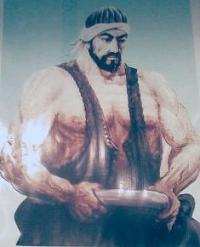Вы здесь
Legend About Pakhlavan Makhmud.

Trip to Khiva.
"Teach them the sciences, give education,
Two worlds will be given to them in retribution,
Give daughters in marriage, marry sons,
Live comfortably, break all sorrow.
Teach your sons strictly
And the blessings they will get in return
There is no doubt that the purpose of creation - we
What reason is the source of the links - we
And if our universe is
That is the best decoration in it - we "
Yusuf Balasaguni. "The story of the merits and benefits of language"
List of monuments of Khiva.
Like almost every ancient city, Khiva had its patron saint. Once it was Sim, the son of the biblical Noah. But from the XIII century, the people call a different name - Pahlavan-Pir (patron of heroes), or simply Pahlavan-ata (father-hero).
This name is known not only in Central Asia, but also in several countries of the East. Many of them have relics associated with the name of this person. And in Iran, professional fighters, before competing with a rival, address a prayer to the patron of fighters, the holy Pahlavan Mahmud.
Pahlavans (bogatyrs) were always worshiped by the people, and each strongman had his own legends. The local oral tradition describes many details related to the life and exploits of Pahlavan Makhmud, who was a famous local poet, a furrier by profession and a philosopher in spirit, had the ability to heal people.
During his lifetime, he gained recognition and fame far beyond the borders of the Khiva Khanate. Pakhlavan Mahmud was especially glorified by his poems in which the hero sang of courage, honesty, love for people. It is called "Khorezm Omar Khayyam."
It is believed that he is the author of more than 300 rubai - traditional oriental quatrains of love and philosophical content, in which Pahlavan Mahmud glorified earthly life with all its sorrows and joys, and also mocked the clergy.
The first of the Europeans who established a direct connection between Pahlavan Makhmud and the author inscribed above the dome of the Rubaiat Mausoleum was the Hungarian orientalist and traveler Arminius Vambery, who visited Khiva in the second half of the XIXth century. under the guise of a wandering dervish.
The son of a simple furrier, Mahmoud, who had helped his father in his hard work since childhood, was endowed with tremendous physical strength. In addition, he was literate, read a lot, versed in poetry and wrote himself Rubai himself.
But most of all, Mahmud was fond of wrestling - kurash. As a young man, he became the strongest fighter of Khiva, and then the whole khanate. He traveled a lot, visited distant countries, won victories over the heroes in India, Afghanistan, Pakistan, Iran, and Iraq.
Only once, having learned that the opponent would face the death penalty in the event of a defeat, he raised it high above his head and lay down on both shoulder blades. Under the pseudonym Piryarvali, Mahmud created many rubayats of contemplative-philosophical, social, and sometimes anti-religious content.
After the death of Pakhlavan Mahmud, the clergy numbered him, canonizing Khiva as patron. A mausoleum was erected over the tomb of Makhmud, buried in the courtyard of his workshop, around which Khiva khans and members of the khan surname were buried.
With the interior decoration of the mausoleum, the striking beauty and diversity of the decorative ornament, the architects skillfully inscribed the poems of Pakhlavan Mahmud in a Vyaz. Rubayats were written in Farsi, and their meaning was not clear to everyone.
Poems Pahlavan Mahmud, who wrote under the pseudonym Piryarvali Mahmud, except those that were found on the tomb walls, have not survived. The Khorezm man traveled a lot, the furrier craft gave him the opportunity to earn a living.
A strongman from Khiva, who became famous for his heroic power of an invincible wrestler, invariably defeated his rivals in Afghanistan, India, Iran, and Iraq. Only once did he fail when he learned that his opponent would face the death penalty in case of failure.
At present, many of these countries have relics associated with the name of Mahmud. And in Iran, professional fighters, before entering into a duel with a rival, address with prayer to the patron of fighters, the holy Pahlavan Mahmud.
In his philosophical studies, the bogatyr developed the concepts of morality, including courage and valor. He was one of the pillars of the Sufi flow "Javonmardlik" ("The courage of youth"), the basic principles of which are the bounty of the soul, mercy, nobility, modesty and humility to the Creator.
According to legend, the poet was buried in the workshop next to his house. After his death, they began to honor him as a feast - the patron saint of Khiva, his modest grave became a place of worship for believers.
The first European to establish a direct connection between Pahlavan Mahmud and the author inscribed above the dome of the Rubai mausoleum was a Hungarian orientalist and traveler Arminius Vamberi, who visited Khiva under the guise of an itinerant dervish.
The best masters and craftsmen of the Khiva khanate took part in the creation of the present complex of architectural structures at the burial of Pahlavan Makhamud.
Enlightener:
Ya. G. Gulyamov. "Monuments of the city of Khiva". Publishing house UzFAN. Tashkent. 1941 "Khiva city and legends" tourist







